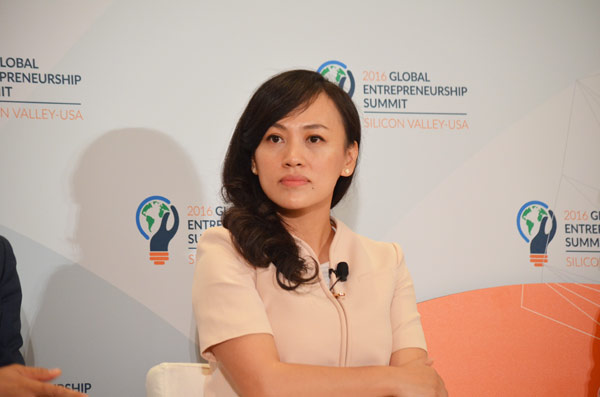
Another example of Chinese people's changing lifestyle is the growth of entertainment industry. "Box office revenues grow 30 percent to 40 percent every year," he said.
"Internet Plus", or traditional industry combining with the internet, is another driving force, according to Deng. He said his firm had just invested in an online education project that linked U.S. and Canadian elementary school teachers to Chinese children from 5 to 12 years old through online video classes.
The third driving force is technological applications, including artificial intelligence, internet of things and cloud infrastructure, because enterprise software application in China "lags behind the U.S. by a big margin", said Deng.
The entrepreneur ecosystem in China is also nurtured by the scale of the Chinese market, which is the fundamental difference between China and the U.S., according to Jean Liu, president of DiDi Chuxing, a ride-hailing company often referred to as the "Uber of China".
The company handles 14 million rides for urban commuters on a daily basis, which means five times the ride-share market in the U.S., she said.
If all the private cars in Beijing were put together, they would cover an area bigger than Manhattan, Liu said. Founded in 2012, Didi has grown to the world's largest mobile transportation platform thanks to the huge market. Last month Didi got a $1 billion investment from Apple.
"Although Didi is the largest by size, it's just a beginning, because China has a huge market and only 1 percent of urban rides are conducted through ride-sharing. So there's a lot of room for us to grow," she said.
"To us, innovation is about tackling local specific issues," she said.
China has made great progress in entrepreneurship in the last decade, but it still has a long way to go to catch up with the U.S., said Deng.
One factor is the Chinese governments are much more involved, but sometimes not in a good way, he said. "But they are learning quickly and I've seen the changes," he added.
Last year, Chinese Premier Li Keqiang launched a mass innovation and entrepreneurship drive to help transform the economy from manufacturing-oriented to service-driven, he said.


















































